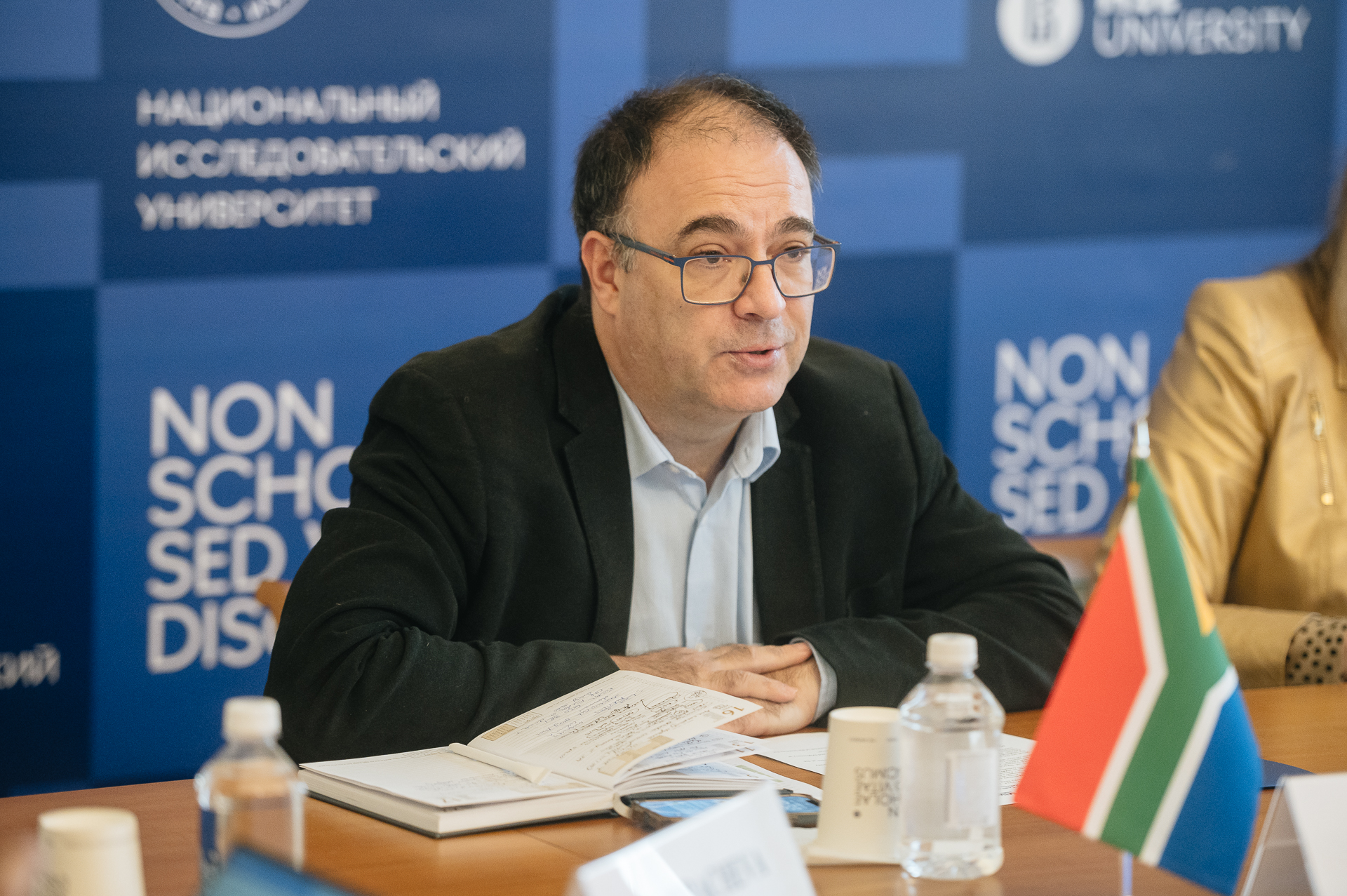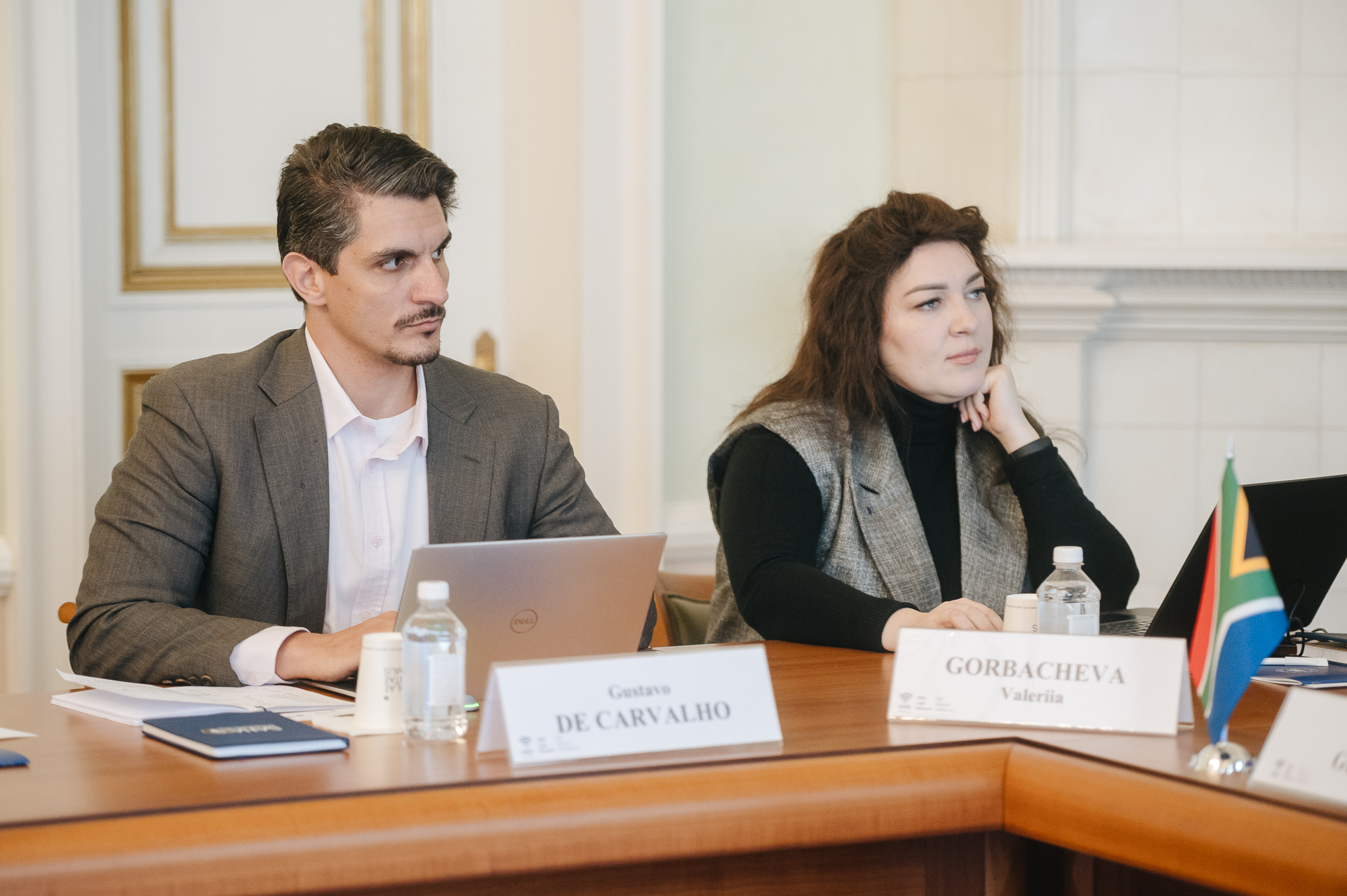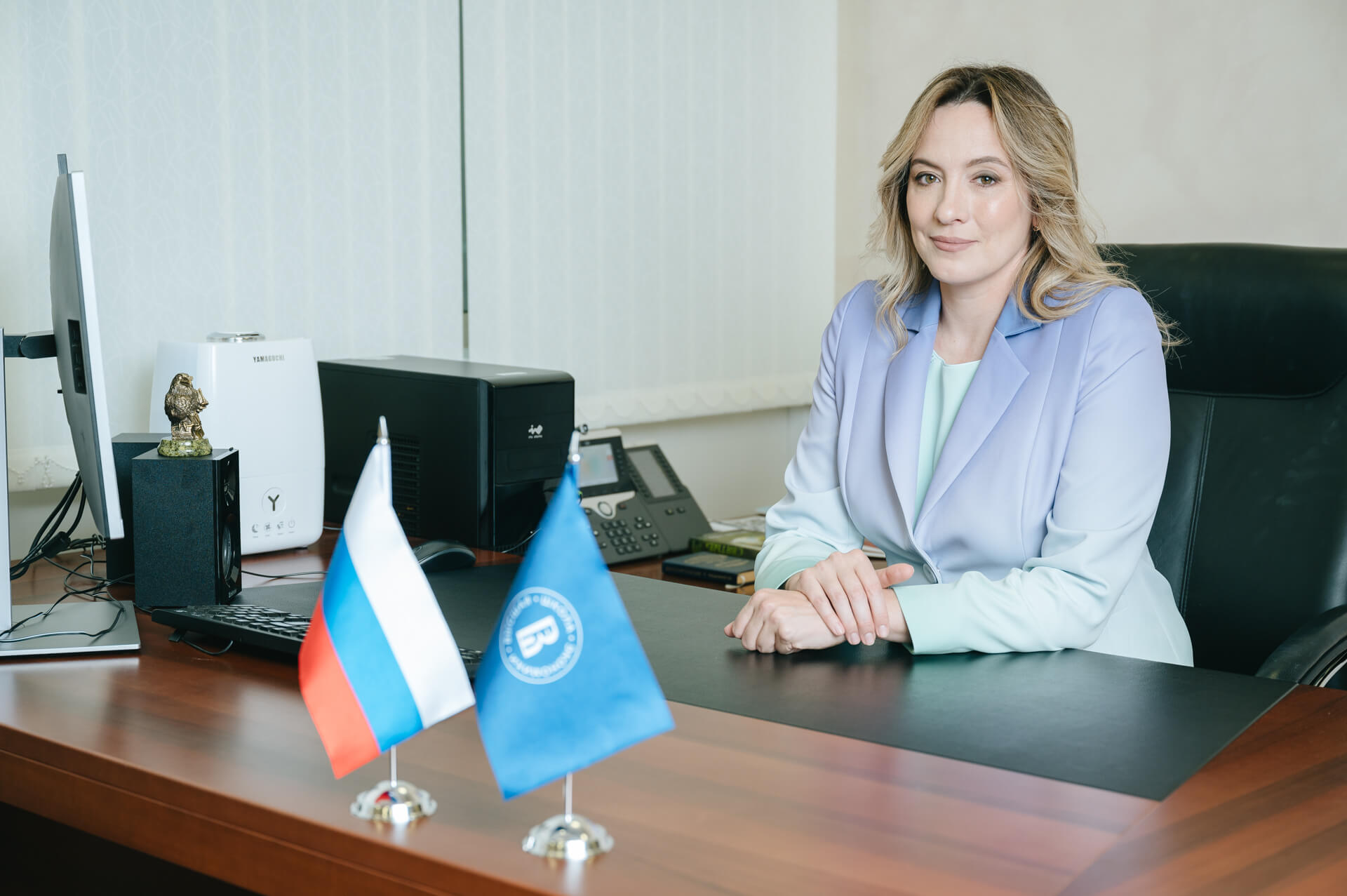HSE Hosts Round Table ‘Africa and BRICS: Reflections and Prospects’
On April 15, 2024 HSE University hosted a roundtable discussion ‘Africa and BRICS: Reflections and Prospects.’ The event featured leading experts from the South African Institute of International Affairs (SAIIA) Steven Gruzd and Gustavo de Carvalho and was moderated by HSE Vice Rector and Head of the BRICS Expert Council–Russia Victoria Panova.
The roundtable discussion focused on the impact of BRICS on the African region and the prospects for development of international relations. Africa and BRICS have been closely collaborating since 2010, strengthening economic ties significantly. Currently, BRICS is the continent's main trading partner. This highlights the need to develop a strategy for further partnership and discuss the outcomes of this collaboration for both sides.
Representatives of BRICS countries and leading experts discussed the history of the organisation, paying special attention to its African component. They emphasized the critical importance of finding compromising solutions to complex international issues in the rapidly evolving multipolar world. It is also crucial to foster cultural, humanitarian, and economic exchanges within BRICS and beyond. This requires the clear gradation of partner countries within the organisation and the establishment of a sovereign financial system applicable to African countries. Tensions within BRICS are unacceptable; diplomatic practice needs to be enhanced and extended beyond BRICS.
Steven Gruzd, Head of the African Governance and Diplomacy programme at the South African Institute of International Affairs (SAIIA), mentioned the historical ties between Russia and South Africa, considering the country's accession to BRICS as one of its main achievements. He noted a paradigm shift in South Africa's BRICS membership, from being perceived solely as a gateway to Africa to becoming one of its main ambassadors and leaders on the international stage. He also assessed the possibilities for future development of multilateral relations between BRICS and African countries.

‘South Africa has demonstrated strong support for its continent within the framework of BRICS and actively represents it on the international stage. It is now crucial to create conditions that allow new members of the alliance to adapt quickly, and South Africa's experience can help in this regard. Our experience in the diplomatic sphere can also contribute to the formation of multilateral relations within BRICS and beyond, as well as help prevent conflicts and escalation,’ the speaker noted. Additionally, the speaker highlighted South Africa's desire for closer and more productive cooperation within the African continent, especially among countries that are members of the same international organisations.

Gustavo de Carvalho, Senior Researcher on African Governance and Diplomacy at the South African Institute of International Affairs (SAIIA), highlighted Africa's increasing role in strengthening international relations within BRICS and called for continued efforts in this direction.
He proposed developing trade relations within BRICS to strengthen the alliance's sovereignty and improve economic conditions in member countries. The accession of new countries presents both advantages and challenges, and Mr de Carvalho emphasised the need for patience in their adaptation.

Victoria Panova, HSE Vice Rector and Head of the BRICS Expert Council–Russia, in her address, drew attention to the role of BRICS in ensuring international security and stability. ‘What can we do to make our voice heard, so that our peoples live in a better world? We represent the World majority. We have every right to promote our vision. Being part of BRICS allows its members to share common approaches to many global tensions. There's an on-going discussion within BRICS on matters such as countering terrorism, ensuring international information security, monetary and financial systems, technological breakthroughs, and sustainable development goals (SDGs). Together, we can work to implement these changes for the greater good.’
The academic track of international relations also has strategic importance. In this regard, Victoria Panova proposed creating an African scientific database, which scholars from BRICS countries and the Global South could access for their research. Combining the potentials of national and regional databases would strengthen the scientific sovereignty of the alliance and create conditions for the progressive development of national academic communities.
The discussion will continue at the national level in face-to-face and online formats for subsequent deliberation with representatives of BRICS countries.
The strategic session took place as part of the work of the BRICS Expert Council–Russia, established in implementation of the Russian Government's mandate at HSE University at the initiative of the Russian Ministry of Foreign Affairs and the Ministry of Finance. The Council is responsible for providing information, analytical, and expert support, for the Russian BRICS chairship in 2024 and is engaged in expert, analytical, and scientific activities on relevant issues of political, socio-economic, and humanitarian cooperation within the alliance. The head of the BRICS Expert Council–Russia is HSE Vice Rector Victoria Panova.
See also:
Showcasing the Diversity of African Heritage at HSE University–St Petersburg
On April 26, HSE University–St Petersburg held the African Festival. Currently, there are more than 100 students from 20 African countries at the university, most of whom showed up for the first festival of its kind this April. HSE's African students proudly presented their traditions, cultural values, vibrant dances, and unique landmarks of their countries. It was an unforgettable journey into the colourful culture and multifaceted heritage of Africa.
‘The Trip Exceeded All Our Expectations’: HSE Students Take Part in BRICS Youth Innovation Summit 2025
The BRICS Youth Innovation Summit 2025 was held in Cape Town on April 10–11, 2025. The event was attended by political and business leaders from Brazil, Russia, India, China, and South Africa. The summit focused on the theme ‘Innovating the Future: Technology for Sustainability and Social Good,’ under which the participants presented their projects. Students of the Faculty of Economic Sciences have shared their experiences of the trip to South Africa, their presentations at the BRICS summit, penguin encounters, and more!
HSE Days in Ghana: How the University Attracts Talents and Expands Cooperation with Africa
In March 2025, HSE Days took place in the Ghanaian capital of Accra, the cultural hub of Kumasi, and the Bono East region. Representatives of the university awarded participants of the HSE International Olympiad (HSE INTO 2025) and spoke to local school pupils and university students about educational opportunities, scholarship programmes, and application pathways to HSE University.
HSE’s Education Observatory Establishes Research Network Across All BRICS Countries
The International Education Observatory initiative, launched by HSE University to focus on expert evaluation, analytics, and joint scientific research, has successfully completed the formation of a research network across all BRICS nations. South Africa was the final link, with the University of Pretoria and the University of the Witwatersrand joining experts from Russia, China, India, and Brazil.
The Future Through the Eyes of Young Scientists
A delegation of teachers and students from the HSE Campus in Nizhny Novgorod participated in the IV Young Scientists Congress and the IX BRICS Young Scientists Forum held in Sochi. These two key events of the Russian Decade of Science and Technology brought together representatives of the academic and university community, state corporations, private businesses, and public organisations to envision the future of Russian science through the lens of the younger generation.
‘We Need Our Own AI Models Trained on Local Data’
The digitalisation of the economy and the rapid development of artificial intelligence (AI) technologies pose new challenges for antitrust authorities worldwide. Major players in the AI market, equipped with significant resources, can block new entrants and set anti-competitive prices. Additionally, the use of AI raises increasingly complex ethical questions for which the global community has yet to develop answers. These and other issues were discussed at the Third BRICS+ Digital Competition Forum.
‘It Is Hard to Imagine High-Level Interpretation Being Entrusted to a Machine’
In 2024, Russia chairs BRICS, an international organisation comprising nine countries. Throughout the year, dozens of forums, working group meetings, and BRICS sessions took place across various Russian cities. As an interpreter, Ksenia Prosyukova, Associate Professor at the HSE School of Foreign Languages and Candidate of Science (PhD) in Pedagogy, participated in several BRICS events. In an interview, she discussed the personal responsibility of working at high-level events, the challenges and prospects of her profession, and how HSE University trains in-demand translators.
HSE Presents an Analytical Handbook on Africa for African Leaders
The HSE University Centre for African Studies has presented an English-language expert-analytical handbook titled ‘Africa 2025: Prospects and Challenges.’ For the first time, Russian experts have prepared a comprehensive work aimed at an African audience rather than Russian readers. The handbook incorporates a significant amount of new data and introduces new approaches for assessing development prospects. The presentation took place in Sochi on November 9, 2024, during the First Ministerial Conference of the Russia–Africa Partnership Forum.
BRICS Representatives Discuss the Development of Statistics in Member Countries
The significance of statistics in today’s digital age has reached a new level. Many decisions at government and business levels are based on data analysis. However, there is a mixed perception of official statistics, which negatively affects trust in public policies. The heads of BRICS statistical agencies discussed this issue and ways to address it at a forum in Kazan, where a representative from HSE University also participated in the event.
HSE Experts Help to Implement Science and Technology Foresight in Africa
The population of African countries is growing so fast that the continent is likely to play a significant role in global development. However, the socio-economic situation in African States remains dramatic. Access to high-quality education, the development of science and high technologies are crucial in addressing these challenges. Professor Alexander Sokolov, Head of the UNESCO Chair on Future Studies at HSE University, spoke at the International Forum of UNESCO Chairs and Partners ‘Transforming Knowledge for Africa’s Future.’ The event took place in Addis Ababa, Ethiopia.


